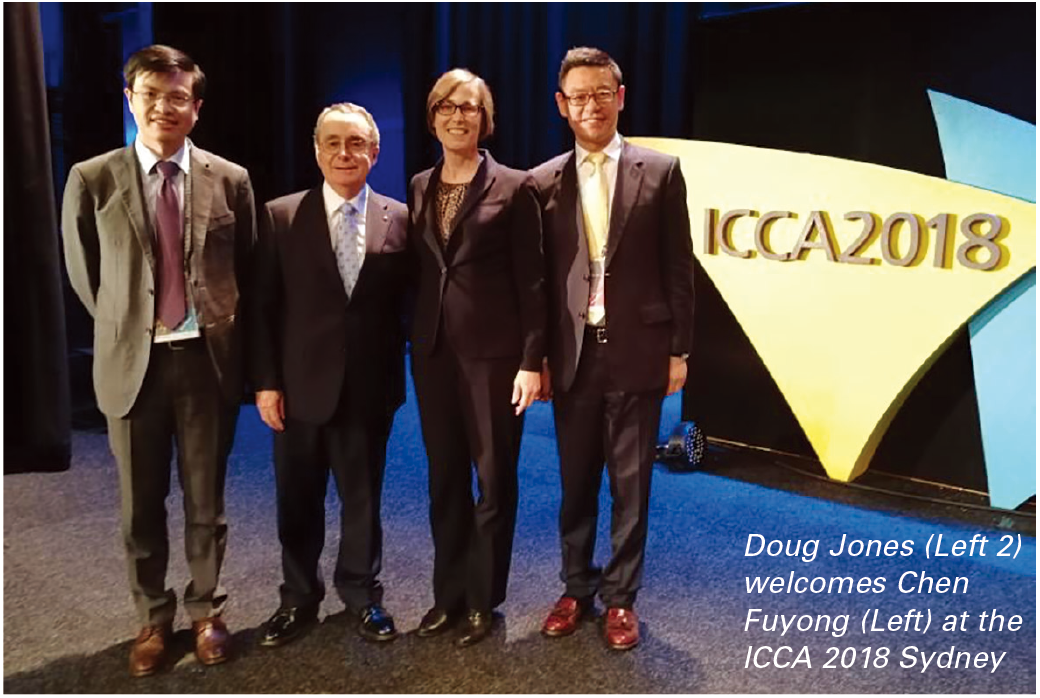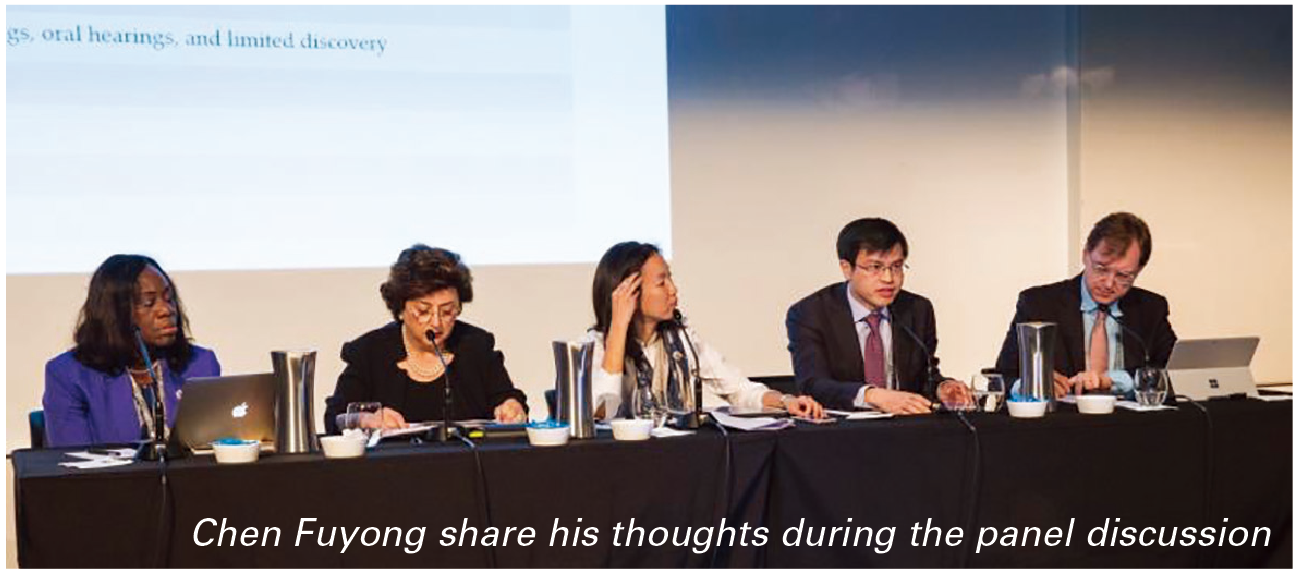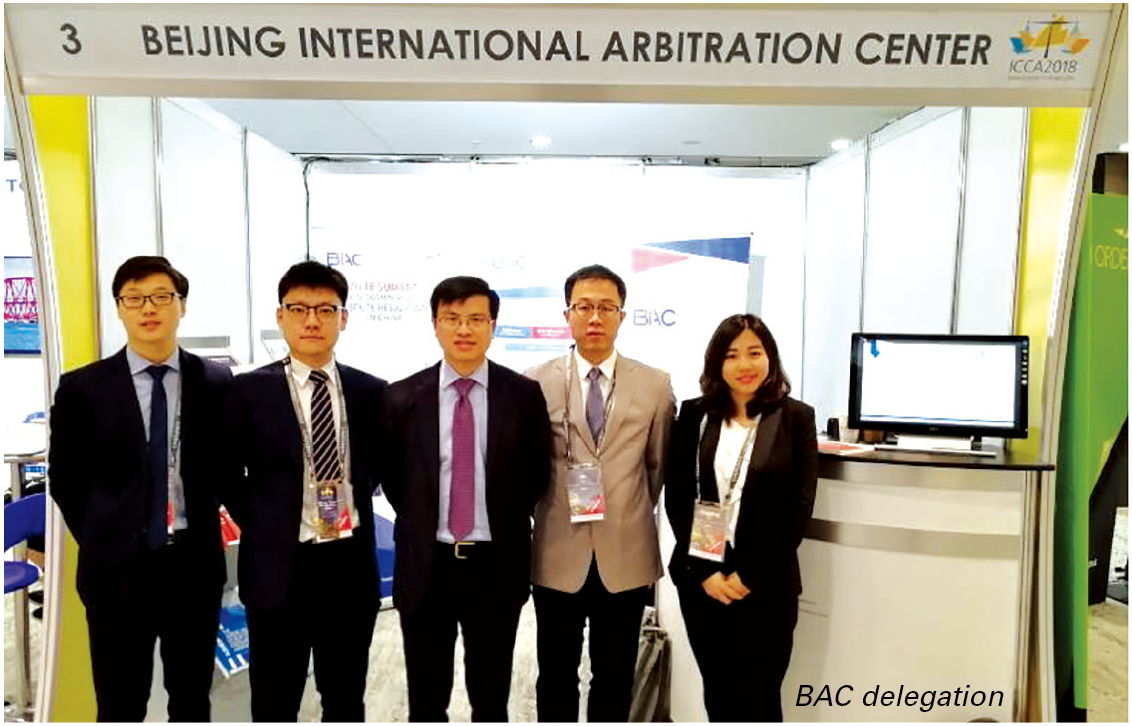 By Chen Fuyong, Beijing Arbitration Commission
By Chen Fuyong, Beijing Arbitration Commission
Chinese delegates shared the thoughts and practices of Chinese arbitration institutions to the international arbitration community at the ICCA congress.
Arbitrators from around the world met earlier this year to discuss the future of international arbitration at the 24th International Council of Commercial Arbitration (ICCA) congress in Sydney, Australia.
The event attracted more than 850 professionals from 65 countries around the world, including a Beijing Arbitration Commission (BAC) delegation consisting of its deputy secretary general Chen Fuyong and other members of staff. The theme of the congress was to sum up the challenges to arbitration and dispute resolution, and to promote an active discussion on possible reforms.
Speakers from common law jurisdictions particularly stressed the challenge to the legitimacy of international arbitration’s law-making practice. In international arbitration, based on the identified substantive governing law, judgment is often needed to supplement the deficiency and ambiguity that lies in the applicable law or the contract, and the arbitral tribunal’s determination will usually leave an influence on the rules of subsequent transactions, which may even become a sort of “soft law”.
However, it is disputed whether arbitration naturally has such a law-making function, with growing doubts about its legitimacy and concerns that it may affect the normal functioning of the precedent system under common law. Meanwhile, once public institutions or public interest is concerned in international arbitration procedures, the balance between “confidentiality” and “transparency” will be further challenged.
Apart from that, challenges to the efficiency and cost of arbitrations also attracted close attention from the speakers. Discussions were mainly focused on whether institutional advantages of other dispute resolution mechanisms can be adopted to review the relationship between party autonomy and arbitral proceedings led by the arbitral tribunal; how newly developed technologies and third-party funding can be reasonably adopted to resolve the parties’ inequality of resources in their appointment of arbitrator, scope of evidence disclosure and procedural participation. In addition, speakers also paid attention in varying degrees to those hotspots concerning public sectors in investment arbitration and ad hoc arbitration, where Shan Wenhua, assistant principal of the Xi’an Jiaotong University, joined in the discussion.
Looking to the future, discussion focused on how technology can be used to facilitate arbitration’s impartiality and efficiency, and how the obsessions and challenges brought by scientific and technological development can be effectively dealt with, while a session on “hot topics and new voices” in international arbitration looked at areas such as the Belt and Road Initiative and investment arbitration, and encouraged young dispute resolution practitioners to let their voices be heard. It is worth mentioning that with regard to the application of AI in international arbitration, the Chinese smart courts and smart arbitration may be said to be at the cutting-edge of lowering linguistic barriers through technology.
In this respect, Shen Hongyu, chief judge of the Fourth Civil Division of the Supreme People’s Court of China, emphatically presented an introduction of Chinese practice from three perspectives of “PRC AI Court Planning”, “PRC Courts’ New Measures for Promotion of ADR Development” and “Experience and Revelation”.
 The truly impressive achievements of Chinese courts in information infrastructure won extensive attention from the audience. Shen pointed out that with the strong promotion of the Supreme People’s Court and relevant authorities, the positive outcomes in improving professionalism and transparency of case hearing resulting from the IT practices of Chinese courts may, to a certain extent, help deal with the challenge to legitimacy raised in this ICCA Congress. Meanwhile, she also introduced the Chinese courts’ efforts in promoting arbitration, mediation and other ADRs by referring to the newly promulgated SPC judicial interpretations and judicial policies. Shen’s speech re-stressed Chinese courts’ arbitration-friendliness, from which international arbitration practitioners are looking forward to China becoming a competitive seat of arbitration.
The truly impressive achievements of Chinese courts in information infrastructure won extensive attention from the audience. Shen pointed out that with the strong promotion of the Supreme People’s Court and relevant authorities, the positive outcomes in improving professionalism and transparency of case hearing resulting from the IT practices of Chinese courts may, to a certain extent, help deal with the challenge to legitimacy raised in this ICCA Congress. Meanwhile, she also introduced the Chinese courts’ efforts in promoting arbitration, mediation and other ADRs by referring to the newly promulgated SPC judicial interpretations and judicial policies. Shen’s speech re-stressed Chinese courts’ arbitration-friendliness, from which international arbitration practitioners are looking forward to China becoming a competitive seat of arbitration.
In a separate panel discussion, Chen Fuyong shared more insights about Chinese arbitration institutions and Chinese arbitration users. He pointed out that the so-called conventional wisdom normally means rules that are widely accepted in international arbitration practice — and yet many “widely accepted” rules in fact are practice of practitioners from a small number of countries. To other countries, including China, such rules are far from being “widely accepted”. Therefore, it is necessary to review the conventional wisdom from time to time. Based on empirical data analysis of Chinese arbitration users, Chen clarified that the primary reason Chinese users have a strong feeling about international arbitration’s high cost and low efficiency is that they usually have no problem with the cost and efficiency of Chinese domestic arbitrations. Taking the BAC as a sample, during the past five years, arbitration in ordinary procedure lasts for less than 140 days from the composition of arbitral tribunal to the conclusion of the case, and in summary procedure this figure is less than 70. Chinese users prefer institutional arbitration to ad hoc arbitration, because arbitration institutions can greatly help control the cost and enhance the efficiency. He also pointed out that the “arb-med” in Chinese practice is deemed by most arbitration users as a deviation from the international “conventional practice” due to local legal tradition and culture. To reduce such concerns from international customers, the BAC Arbitration Rules specifically stipulate that when mediation conducted during arbitration procedure fails, the parties may request replacement of arbitrators. With respect to the “tribunal secretary” that has been widely used in international arbitration in recent years, Chen pointed out by reference to the change of responsibility of case managers in Chinese practice that some international norms that China has been constantly following up in fact are developing into those adopted in Chinese domestic regularities.
 In his closing speech, Thomas Frederick Bathurst, chief justice of the Supreme Court of New South Wales, specifically mentioned Chen’s speech and said that the Chinese arbitration experience he introduced with the sample practice of the BAC was worth study by the international arbitration community.
In his closing speech, Thomas Frederick Bathurst, chief justice of the Supreme Court of New South Wales, specifically mentioned Chen’s speech and said that the Chinese arbitration experience he introduced with the sample practice of the BAC was worth study by the international arbitration community.
In addition to its participation in the congress, the BAC delegation set its exhibition booth at the venue of the congress, where it has had in-depth exchange with professionals from various jurisdictions and introduced the BAC practice and the Chinese arbitration thereto. The “Visit BAC” booklet specifically made by the BAC delegation provided an introduction of the BAC’s leading position in the Chinese arbitration industry as well as the BAC’s effort in promoting the integration of the standards, practices and theories between the international arbitration and the Chinese arbitration to roughly 200 visitors in a manner in conformity with the international criteria.
Meanwhile, the BAC delegation based on the Commercial Dispute Resolution in China: An Annual Review and Preview (2017) provided a systematic introduction of the up-to-date development of the Chinese dispute resolution industry, covering sectors of commercial arbitration, commercial mediation, construction, real estate, energy, investment, international trade, finance, intellectual property, film and television and general aviation, which served as a bridge for exchange and mutual trust between Chinese and foreign arbitration practitioners. It also showcased the upcoming 2018 summits on commercial dispute resolution in China to be held in Europe and Hong Kong to about 140 visitors including the ICCA president, members of the Governing Board of the ICCA, representative arbitration practitioners from European and Asian countries (including several members of governmental delegations to the Working Group II of the UNCITRAL).
Apart from that, with the support of the organiser of this ICCA congress, the BAC held two breakfast seminars at the venue of the congress, which attracted dozens of arbitration practitioners from various countries. The BAC’s member of staff introduced the statistics and practice of the BAC concerning business development, service quality, constitution of arbitrators, pre- and post-dispute services, and also the BAC’s achievements in improving its arbitration transparency and promoting diversified dispute resolution development under the theme of the ICCA congress. Chen Fuyong had a face-to-face exchange with the audience on the BAC administration of its arbitrators, the Belt and Road Initiative and the judicial review of arbitration in China, which directly attracted interest of international arbitration colleagues, including the former US Ambassador in New Zealand, in learning more about the BAC and having more cooperation therewith.
The ICCA congress is an international conference with the largest scale and influence in the area of international arbitration, and is praised as the Olympic Games of the international arbitration community. The ICCA congress is a biennial event and has been held for 24 sessions. With the combination of professional voices from different jurisdictions, this congress helped promote a reconsideration of the existing rules in international arbitration, which is of far-reaching value both in theory and in practice. The BAC delegation proactively unveiled the thoughts and practices of Chinese arbitration institutions to the international arbitration community, which is undoubtedly helpful in building an open and professional image of Chinese arbitration, and thereby to promote the overall development of the BAC and even the Chinese arbitration industry.




















